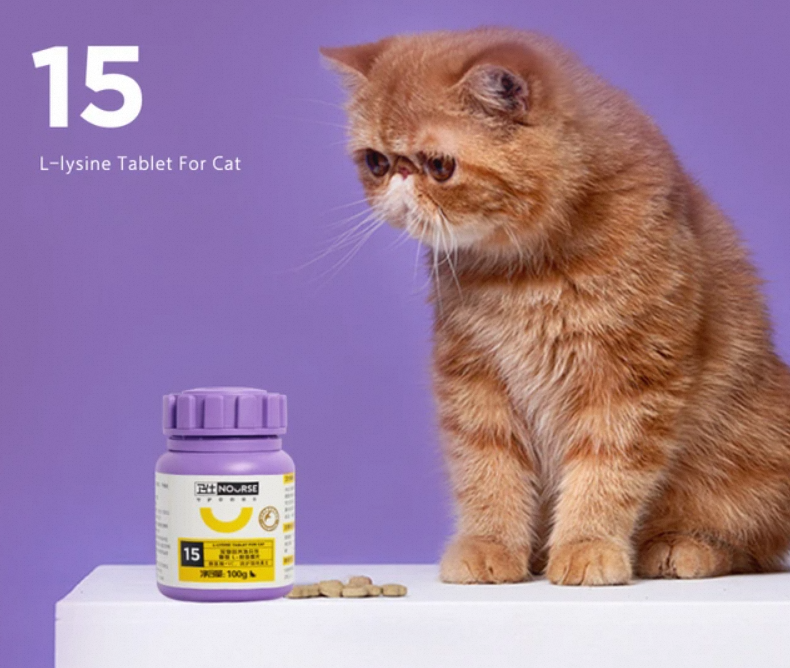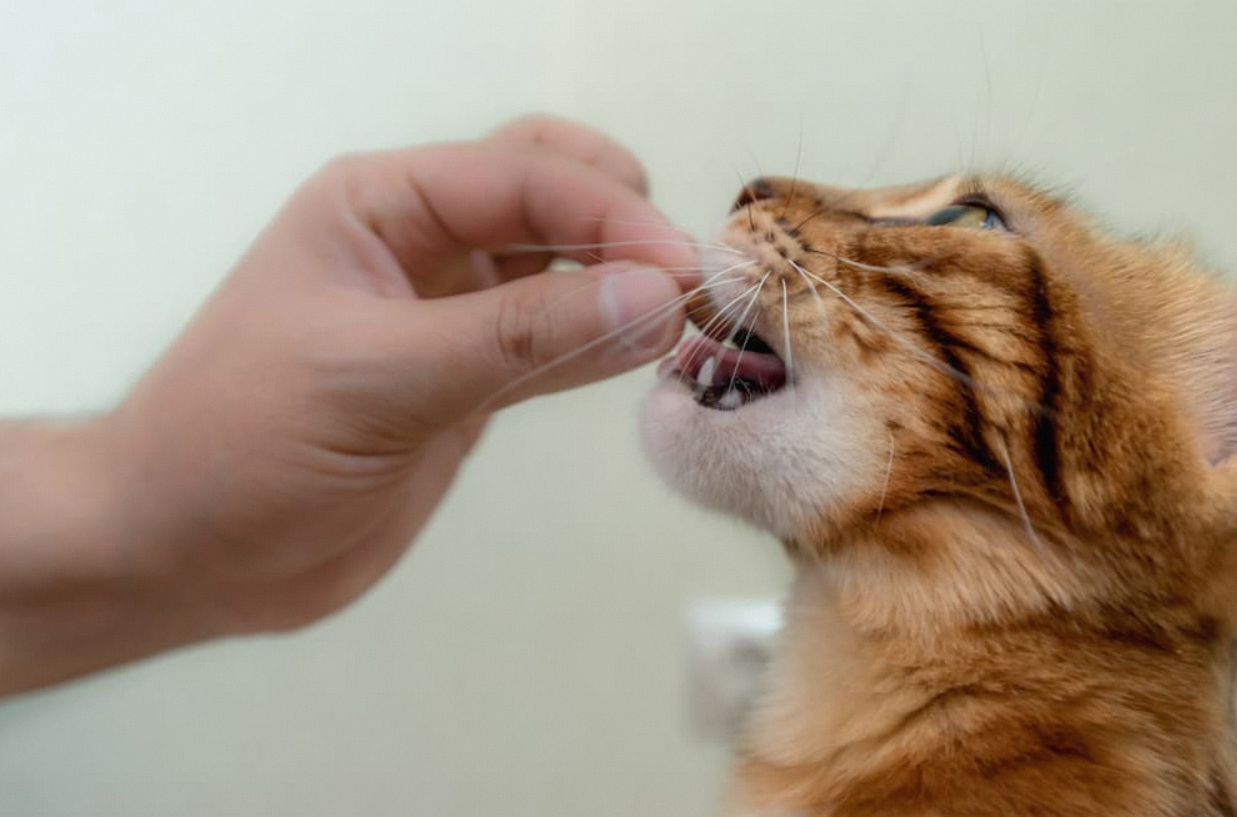Lysine is an essential amino acid for cats. While cats can get a certain amount of lysine from their food, in some cases, they need additional supplementation to meet their needs. There are so many Lysine products in sale, do you know how to use them or how to choose the right thing for your kittens? Let’s have a look in this article.
In This Article
How much Lysine does your cat need?
 Recommended doses of lysine for cats will vary based on your cat’s weight, age, and specific health conditions.
Recommended doses of lysine for cats will vary based on your cat’s weight, age, and specific health conditions.
· Adult cats
The recommended lysine dosage for adult cats is generally 250-500 milligrams (mg) per day. This range of doses accommodates cats of varying weights. Also, it can provide enough lysine to support their immune system and health.
· Kittens and young cats
For kittens and young cats, it is also recommended to supplement 250-500 milligrams (mg) of lysine per day. As smaller cats, the dose might be lower, while larger cats might require a higher dose. Cats at this stage require additional nutritional support to promote growth and development.
What forms of Lysine Supplements?
Feline lysine supplements are available in a variety of forms, each with its own features and benefits. Choosing a cat-friendly lysine supplement form can improve your cat’s acceptability and convenience. Here are a few common forms of lysine supplements for cats.
 Oral tablets: Lysine supplements are usually available in small tablets. These tablets can be given directly to cats and allowed to be swallowed. The advantages of oral tablets are accurate dosing and ease of storage and use. However, some cats may not like swallowing tablets, so it’s necessary to take some techniques or give them with other foods.
Oral tablets: Lysine supplements are usually available in small tablets. These tablets can be given directly to cats and allowed to be swallowed. The advantages of oral tablets are accurate dosing and ease of storage and use. However, some cats may not like swallowing tablets, so it’s necessary to take some techniques or give them with other foods.
Softgels: Lysine supplements can be made in softgel form. You can feed cats the whole softgel, or you can open the contents and sprinkle it on food. Cat babies will swallow them easily and they can absorb the liquid or powder form inside more easily. However, some cats may be resistant to the outer shell of the capsules, so you should mix food with them.
Liquid: Liquid form is another form. These liquids can be given directly to the cat through a measure or dropper. Lysine supplements in liquid form are generally better accepted by cats, especially those who don’t like to swallow pills or softgels. Plus, the liquid form allows for easy dosage adjustment. However, cat owners should pay attention to certain preservation and storage precautions for liquid supplements.
Powder or syrup: Lysine supplements are also available in powder or syrup form, which can be added to your cat’s food. As the same as Liquid supplements, cats prefer this form of supplement for it can be taken with food. While, some cats may be resistant to the taste or texture of their food, so they need some time to adapt.
Recommended Lysine partners for cats
It’s helpful to combine lysine with other supplements to help your cat reach its healthiest status. But before doing this, you have better to seek advice from veterinarian to determine your cat needs and an appropriate combination of supplements. Here are some common supplements that can be used with lysine to promote cat health.
 Omega-3 Fatty Acids: Omega-3 fatty acids are vital nutrients for your cat’s health, promoting a healthy heart, joints, skin and coat. When it is used together with lysine, it can provide comprehensive nutritional support and enhance immune system function.
Omega-3 Fatty Acids: Omega-3 fatty acids are vital nutrients for your cat’s health, promoting a healthy heart, joints, skin and coat. When it is used together with lysine, it can provide comprehensive nutritional support and enhance immune system function.
Vitamins and Minerals: Vitamins and minerals are key nutrients that cats need. Used in conjunction with Lysine, this ensures your cat is getting adequate vitamins and minerals to support their immune system, bones, teeth and body development.
Vitamins and Minerals: Vitamins and minerals are key nutrients that cats need. Used in conjunction with Lysine, this ensures your cat can get adequate vitamins and minerals to support their immune system, bones, teeth and body development.
Probiotics: Probiotics are beneficial gut bacteria that are important for your cat’s digestive and immune systems. It’s a good partner for lysine. They can maintain intestinal health, promote nutrient absorption, and enhance immune function.
Antioxidants: Antioxidants can help fight free radicals, reduce inflammation and cell damage, and provide support to protect your cat’s immune system. Try to use it with lysine, your cat will become more healthy and immunity will be enhanced.
Choline: Choline is a beneficial nutrient that is important for your cat’s brain function and nervous system development. It will provide comprehensive neurological and cognitive support when it combined with lysine.
Is lysine good for cats with allergies?
 Lysine is useful to mitigate allergic reactions in cats to some extent. Allergy is a reaction in which the immune system is overly sensitive to external substances. While, Lysine is an essential amino acid for cats. It can promote the normal operation of immune function and participate in the synthesis of antibodies.
Lysine is useful to mitigate allergic reactions in cats to some extent. Allergy is a reaction in which the immune system is overly sensitive to external substances. While, Lysine is an essential amino acid for cats. It can promote the normal operation of immune function and participate in the synthesis of antibodies.
Allergies can cause inflammation and other uncomfortable symptoms, and some cats may be allergic to food. Lysine can reduce the allergic reactions by enhancing the function of the immune system. It helps regulate immune cell activity, reduces inflammatory responses, and provides immunomodulatory support.
However, it is important to note that lysine does not completely cure allergy symptoms, nor is it a substitute for allergy diagnosis and treatment. If your cat shows allergy symptoms, such as itchy skin, vomiting, diarrhea, etc., it is best to seek advice from your veterinarian. A veterinarian can perform allergy testing to determine the source of the allergy and develop an appropriate treatment plan.
 From this point of view, lysine supplementation is indeed very important for cats. Cat owners can choose suitable supplies for their cats. In addition to nutritional supplements, the owner’s companionship and sensitive care are also essential. With both physical and mental health, cats can grow up healthily.
From this point of view, lysine supplementation is indeed very important for cats. Cat owners can choose suitable supplies for their cats. In addition to nutritional supplements, the owner’s companionship and sensitive care are also essential. With both physical and mental health, cats can grow up healthily.